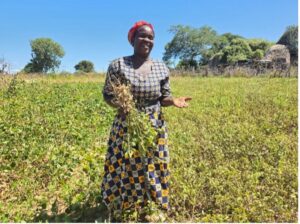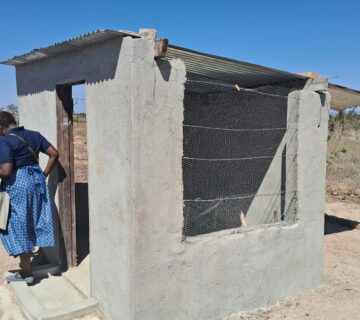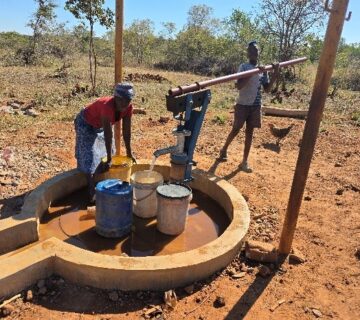A tale of happy farmers

The 2024/25 season has brought remarkable success to Muchekayaora, particularly with sorghum. Farmers have reported excellent harvests, and many are now threshing their crops for storage.
“Sorghum did well across the community,” said Lorita Zivanai, a Lead farmer in Muchekayaora Village.
However, not all crops fared equally. While sorghum thrived, cowpeas and groundnuts struggled in most villages in ward 36 and ward 9 which could have been contributed by the dry spell that hit them after planting.
Finger millet showed promise in some areas, but overall, the feedback on its performance from other farmers in the village, led by Lorita, was mixed.Initially, many farmers felt the quantity of seed provided was insufficient, i.e 1kg supplies of finger millet, pear millet and sorghum evidently, they were proved wrong with the yields they got from the seemed small seed quantities. “We underestimated the quantities, yet the yield flabbergasted us,” she said.
The role of the Tsungai Project and Agritex officers was pivotal in guiding on the proper planting techniques alleviated fears of wasting seeds, allowing farmers to maximize their harvests. “We are happy that for the next three years, we won’t have to worry about seed,” Lorita said, highlighting the stability this brings.
Despite facing challenges like armyworms, farmers effectively managed pests using homegrown solutions, such as chili sprays. Even though some farmers were slow to react, these methods protected their crops without the need for chemicals. The combination of good rains, mulching, and innovative planting methods contributed significantly to the successful harvest. They implemented what they were taught during trainings by Tsungai Project which aims to strengthen resilience and improve food security of 3,900 vulnerable households (15,600 individuals) affected by recurring droughts and mid-season dry spells by increasing their capacity to produce appropriate climate-smart food crop varieties in 10 wards of Gutu District.
Alice Chari from Rafamoyo Village Ward 9, reflected on their experience with the basin hole planting method for pearl millet and sorghum, stating, “With the help of Tsungai, I realized that my harvest is healthier than ever.” This innovative approach has transformed their farming practices, leading to better yields.
As preparations begin for the next planting season, the communities are eager to implement early preparations and adhere to recommended planting times. “We planted groundnuts a bit late this season but still managed a small harvest. Just imagine what we could achieve if we plant on time!” Alice expressed with optimism.
This season’s success has also improved dietary options within many households. Where once a day meal consisted of basic staples, families can now enjoy porridge (made of either sorghum or pearl millets), tea with nuts, and even Maheu, showcasing a shift towards more nutritious options. “We are flourishing in abundance,” Onai Mudiwa of Chin’ai Village declared, emphasizing the positive impact of the Tsungai Project efforts on their overall well-being.
Financial security is another significant outcome of this harvest. Farmers are now able to sell surplus produce to cover school fees and other necessities, reducing their reliance on casual labor. “No more buying food; now we can afford luxuries,” said Mr Taonezvi of Chikara Village, Ward 13 reflecting the newfound stability.



No comment